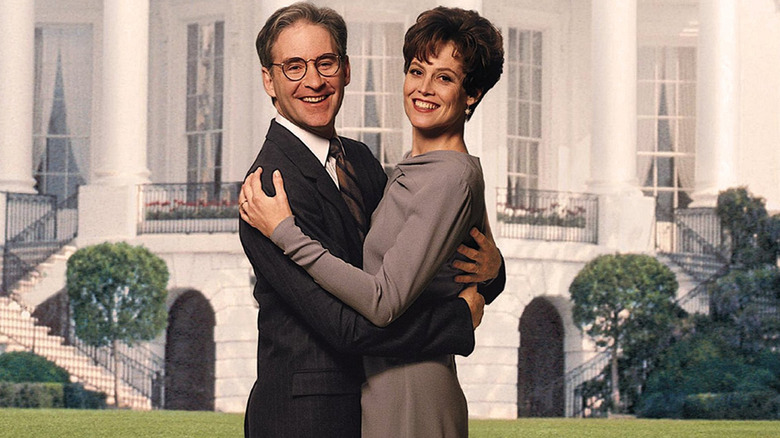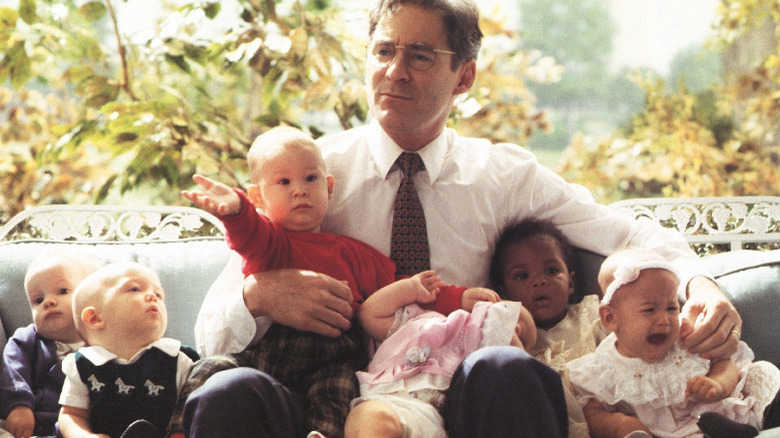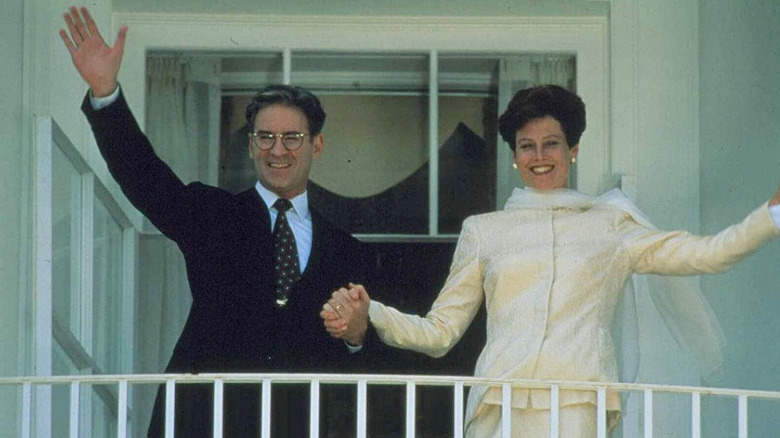Let's Talk About The Most Underrated Ivan Reitman Movie
Ivan Reitman's comedies were a fundamental part of my childhood growing up in the 1990s. In fact, it's because of him that part of me still thinks of Arnold Schwarzenegger as a comedy actor first and an action movie star second — having watched "Twins" and "Kindergarten Cop" far more often as a kid than any of his '80s and '90s shoot-em-ups (save for "Terminator 2: Judgement Day"). Outside of his directorial efforts, Reitman was involved in producing "Beethoven" and "Space Jam," two of the biggest family comedy hits of the '90s that didn't involve Disney and films that helped instill both my lifelong love of dogs and basketball phase when I was younger. And yet, for as much all those titles and, of course, the first two "Ghostbusters" movies helped shape my filmic tastes and influenced the world of modern comedy, it was Reitman's (underrated, I would argue) efforts behind the camera on 1993's "Dave" that may have left the longest-lasting impact on me as I look back and reflect in the wake of his passing.
In case you're not familiar: "Dave" stars Kevin Kline as Dave Kovic, a lovely fellow who gets around using a bicycle, sings Broadway tunes off the top of his head, and works at a temporary employment agency in Washington, D.C. He also does a spot-on impersonation of U.S. President Bill Mitchell (Kline, again), which is why Secret Service agent Duane Stevenson (Ving Rhames) turns to him when he needs someone to impersonate Mitchell after a speech, under the pretense that it's a safety precaution. In reality, it's to cover up Mitchell's affair with his staffer Randi (Laura Linney, making the most of a thankless role), but it abruptly evolves into much more than that after the real Mitchell suffers a stroke that leaves him in a permanent coma. Plotting to use this to his advantage, Mitchell's corrupt Chief of Staff Bob Alexander (Frank Langella) schemes with Communications Director Alan Reed (Kevin Dunn) to pass Dave off as the real Mitchell until he can force out Vice President Gary Nance (Ben Kingsley) by pinning a scandal on him, dump Dave, and then ascend to the Presidency by revealing the truth about Mitchell's status.
What Makes Dave Great
For as much as we rightly cherish Frank Capra films like "Mr. Smith Goes to Washington," "Meet John Doe," and "It's a Wonderful Life" for championing everyday people who take on indecent U.S. politicians and wealthy individuals in their battle to make the world a better place, "Dave" is one of the rare mainstream political comedies made in that same mold that I can readily think of from the last 30 years or so. It's also a very funny movie that's full of great quotes and small moments of character-driven humor — like when the no-nonsense Stevenson admits to Dave that he's insecure about wearing sweaters because he worries they make his neck look too thick — scripted by Gary Ross ("Big," "Pleasantville," "The Hunger Games"). "Dave" was equally well-served by Reitman's steady direction, using montages when needed to keep the pace moving at a brisk pace yet pausing to allow the more dramatic scenes the room they need to breathe. What's more, it's a movie that director of photography Adam Greenberg (the first two "Terminator" films) shot in un-flashy yet sharp shot compositions, reminding everyone that comedies can look just as polished and "cinematic" as any other type of movie.
And let's not forget the cast! Kline is as charming as he's ever been as the title character in "Dave" (suffice it to say, this movie was largely responsible for my unabating crush on him), as is Rhames as the straight-man to his whimsical hero. Equally great: Charles Grodin as Dave's typically exasperated pal Murray Blum — whose cynicism melts ever so much when his friend needs his help for a good cause — and Sigourney Weaver as the progressive First Lady Ellen Mitchell, who quickly realizes there's something's amiss when Dave replaces her estranged husband and she soon begins to fall in love with his "replacement." For those who haven't seen the movie yet, don't worry, Dave never takes advantage of Ellen's privacy or trust while pretending to be Bill Mitchell. Quite the opposite, the film subverts this problematic comedy trope at one point by having Ellen angrily barge in on a naked Dave (while he's taking a shower) to berate him for what was really one of Bob's despicable, underhanded deeds.
Speaking of Bob, Langella has an absolute field day playing the unscrupulous, power-hungry politician. As darkly funny as it is when Bob, furious after Dave goes behind his back to cut the Federal Budget and fund a homeless shelter program backed by Ellen, says "I'm going to kill him ... He's not a President. He's an ordinary person. I can kill an ordinary person," it works because you believe that Langella absolutely means it.
Reitman Believed in the American Experiment
"Dave" made $63.3 million in theaters (via Box Office Mojo) on a $28 million budget and was well-reviewed by critics upon its initial release, even landing an Oscar nod for Ross' original screenplay. That might make it seem like the opposite of an "underrated" film, but consider this: "Dave" fell well short of the box office grosses for the first two "Ghostbusters" movies, "Twins," and "Kindergarten Cop," all of which cleared $200 million (via The Numbers) over the nine years leading up to its release in 1993. Heck, even the Reitman-directed 1998 action-comedy "Six Days, Seven Nights," which I don't believe anyone would argue represented the filmmaker at his finest, took in $164.8 million. When I think about how much more attention those movies have always gotten than "Dave," I can't help but feel it's not been given its proper due, least of all when considering how well it holds up almost thirty years later.
Perhaps it's because "Dave" subscribes to the idea that the "American Experiment" is worth fighting for and suggests there are still people in Washington, D.C. (like Ellen Mitchell and Gary Nance, who Bob and Alan coldly dismiss for being a "boy scout") who are actively trying to make a positive difference. That message was already overly optimistic when Reitman directed the film in the early '90s and feels dangerously naive these days — a time when it seems like the Bob Alexanders of the world have won, and more and more people have come to believe the "American Experiment" was always a lie. (That's the direction I lean in, anyway.) But maybe that's why Reitman, whose mother and father were Hungarian Jewish immigrants who survived Auschwitz and fought during WWII, saw the value in a political fantasy like "Dave." It was never meant to be a blueprint for how to fix the U.S.' many problems, it was always a picker-upper and a feel-good reminder: If you really hope to see any change in society, then you have to just get out and make it happen yourself.
"Dave" is available to rent on multiple platforms.


